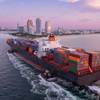EU Leaders Seek More Vessels for Libyan Coastguard
Migrant arrivals from Libya to EU member state Italy are higher this year than last at more than 175,000 people. Curbing immigration is the bloc's top priority after about 1.4 million refugees and migrants reached it in 2015-2016.
The EU's naval operation in the Mediterranean, Sophia, which is targeting arms traffickers and training the Libyan coastguard, is obliged to pluck out of the sea people who leave Libya in unreliable boats provided by people smugglers, meaning most of those who reach Italy arrive on EU vessels.
One EU official said the bloc is increasingly worried that Sophia "has become a taxi service".
At their summit in Brussels on Thursday, EU leaders will agree on "the need to enhance support for the Libyan coastguard", according to a draft joint statement.
An EU diplomat said the bloc needed to find a way to finance the Libyan coastguard or provide it with vessels directly: "The idea would be to make it more effective in preventing migrants from leaving Libya rather than just having our search and rescue operations."
Diplomats say that has so far proven difficult to agree among member states and Brussels, and can carry risks because of the breakdown of law and order in Libya, which has allowed the smuggler gangs to operate freely.
Libya has been engulfed in chaos since the West, including EU states, helped rebels oust its long-time ruler Muammar Gaddafi in 2011.
While the country now has a U.N.-backed government in Tripoli, it has been struggling to impose its authority on rival factions, leaving Libya caught up in factional fighting between various groups of former rebels who had battled Gaddafi.
The United Nations has said migrants in Libya - mostly coming from sub-Saharan Africa on their way to Europe - are suffering consistent and widespread abuse, including arbitrary detention, forced labour, rape and torture.















